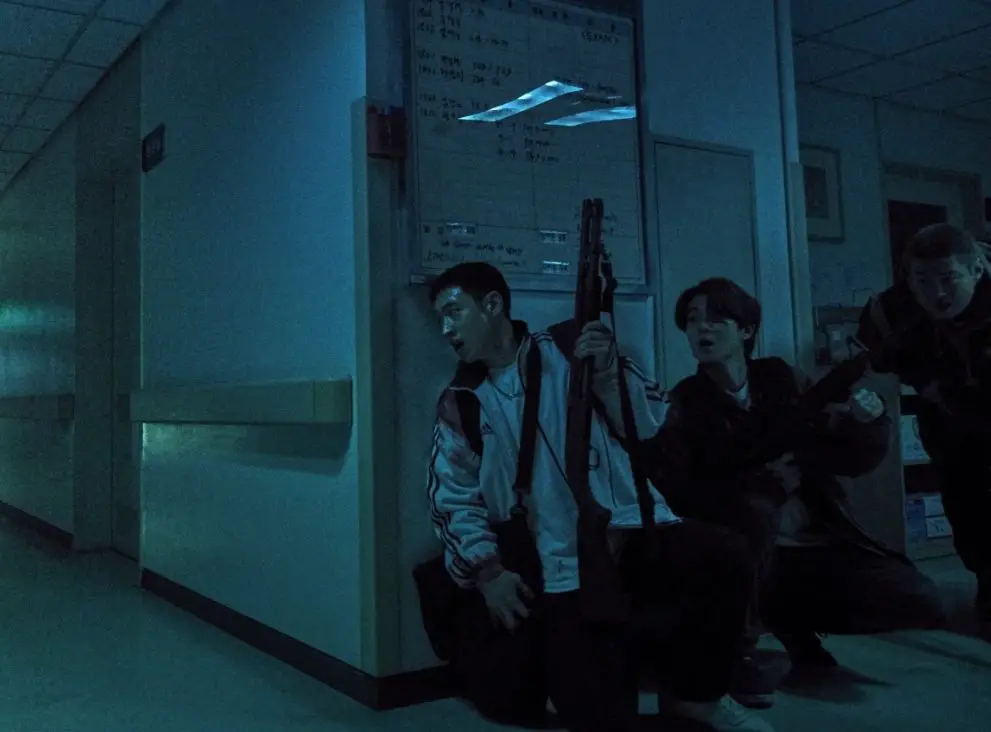A major heist by a group of antiheroes is not an uncommon movie plot. Recently, Netflix subscribers have become obsessed with the Spanish TV drama “La Casa de Papel,” also known as “Money Heist.” People can’t seem to get enough of crime/thriller cinema that reflects real socio-economic concerns. Thus, director Yoon Sung-hyun’s new dystopian thriller, “Time to Hunt,” is a very welcomed addition to the genre.
“Time to Hunt” takes place in a dystopian Seoul, as South Korea faces a horrifying financial crisis and relies on a bailout from the International Monetary Fund (IMF). During this time, nearly everyone has lost their job, the Korean won has lost its value and being imprisoned might be a better option than living in the streets of Seoul. In this bleak version of South Korea, a group of four hopeful and naive young men plan to execute the heist of their lives, guaranteeing them a way out — a ticket out of hell.
The “Bleak Night” director killed it with the shots for this film. “Time to Hunt” begins with a full tour of what Seoul has become, a representation of what today’s South Korean youth refer to as “Hell Joseon.” The streets are filled with anti-IMF protesters with signs lit on fire, cars have been rummaged and left behind and buildings are stained with graffiti.
The depiction of Hell Joseon serves as a contrast to the actual seemingly developed and harmonious South Korea. The rather long introduction to the inhumane world is Yoon’s way of convincing the audience that South Korea is broken. The real South Korea looks good from the outside, with its accelerating economic and cultural development, but within lies a lot of problems such as poverty and class conflict. Yet, few recognize these issues simply by looking at the surface. Yoon’s dystopian nation reflects on the real concerns of the country in a straightforward manner.
Amidst this monetary crisis, viewers meet the group of hunters: ex-convict Jun-seok (Lee Je-hoon) with his best friends and accomplices Ki-hoon (Choi Woo-sik) and Jang-ho (Ahn Jae-hong) and the insider Sang-soo (Park Jung-min). The leader, Jun-seok, was just released from prison after serving three years because he was caught covering for his accomplices in their first robbery. Unfortunately, for Jun-seok, the sight outside of prison is not as bright as he expected. Though his best friends have tried their best to keep what is left of the robbery, Jun-seok has to face the reality that what they took is now worthless due to the financial catastrophe.
Still, Jun-seok remains hopeful of the situation — some might even say ignorant. Jun-seok has a dream escape, a safe haven, which his acquaintance from prison has promised in exchange for a significant sum of cash. He persuades his friends to pull one last scheme: the ultimate heist that will guarantee them an escape out of hell to a beautiful resort island where they can finally be treated as humans. The project is to rob an illegal gambling house run by a web of gangsters.
The hunters’ perhaps naive ambitions in “Time to Hunt” represent millennials and Gen Z really well. It is rare for younger people to have jobs that provide economic security. They can’t afford to buy houses, unlike their parents or grandparents, and most live paycheck to paycheck. They are basically hanging on by a thread. The four young men are the same. They’re merely trying to survive another day, but they have to be a little more creative to earn money because no one will hire someone with a criminal record.
In “Time to Hunt,” society is broken and dragging everybody down with it.
What is so great about the film, aside from the various parallels to contemporary problems, is that the audience is subject to a huge amount of tension without the movie having to be a gorefest. “Time to Hunt” still includes violence, but the thrills come from psychological torture instead of a physical one.
Throughout the film, director Yoon emphasizes the characters so heavily that viewers don’t really see much of the heist itself. This tactic is both a good and bad feature of the film. The good thing about focusing on the characters is that the audience is able to build a connection with each role. They relate to the characters and understand their reasonings, which helps construct a love-hate relationship with the antiheroes. Viewers may find themselves rooting for the robbers or disagreeing with their actions. Either way, it’s very engaging.
However, the film loses a little bit by wanting too much in too little time. The heist itself is too short in contrast to “Money Heist,” in which the focus is the theft; instead, the story centers on the psychological thrill of the chase after the heist. This is not necessarily a bad thing, since a good “Tom & Jerry” chase is always a delight. However, the audience is thrown into a rather messy mix of genres, between the action of a hot-blooded paid assassin going after a group of amateur robbers, and the drama in which ordinary people are looking to be loved and secure. The two aspects are not explored deeply enough or adequately paced for “Time to Hunt” viewers to properly enjoy both.
Regardless, “Time to Hunt” is an interesting film that highlights a psychologically haunting quest in a dystopian Seoul, which reflects on real-world modern class struggles. For the younger generations who were not born into a rich family, and are instead stuck in the middle of a pandemic and financial crisis and struggling to get by, the movie remains relevant and is worth the watch.

















